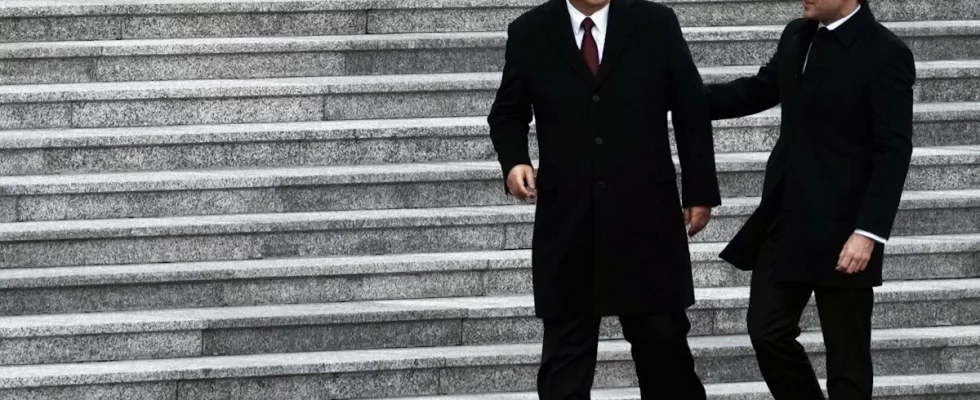No, you probably won’t catch a glimpse of Chinese state and party leader Xi Jinping in his biker outfit. He is not Vladimir Putin, who likes to be photographed in sporty clothes. But perhaps there will still be a touch of the Tour de France when Xi and his French host Emmanuel Macron visit the Col du Tourmalet in the Pyrenees earlier this week. After all, it is one of the most famous climbs in cycling, a “stronghold of French sporting culture”, as the Élysée emphasizes.
Because the French president’s grandmother once lived near this mountain pass, French media now speculate, that Macron wants to return the favor for the personal insights that Xi gave him last year at a tea ceremony in Guangzhou, southern China. Xi’s father was provincial governor there in the early 1980s.
Macron could use the meeting with Xi to reaffirm Europe’s unity
It is Xi’s first trip to Europe in five years. After France, the program includes Serbia and then Hungary. With the six-day trip, the Chinese leadership has two goals, as Abigaël Vasselier of the China-focused think tank Merics explains: “to get Europe-China relations back on track” and to counter the European view that China’s growing support for Russia in Ukraine -War must have consequences.
First France, where Xi arrived on Sunday and is spending Monday in the capital: With the celebration of the 60th anniversary of diplomatic relations between Paris and Beijing, Xi is looking for a “feel-good moment” that will have a positive impact on bilateral relations with the EU can affect the whole thing. But despite the picture-perfect tour to the Pyrenees scheduled for Tuesday, conflicts are likely. “Paris will put China’s support for Russia at the center of the discussion,” expects Vasselier. Macron had already tried unsuccessfully to get Xi to influence his friend Putin a year ago.
Macron could also use the meeting with Xi to reaffirm Europe’s unity, as the Chinese are often accused of wanting to divide the EU. According to reports, he told Chancellor Olaf Scholz at a private dinner in Paris on Thursday that he would also come when EU Commission President Ursula von der Leyen meets with Macron and Xi in Paris on Monday. Unlike Scholz last month, Macron also had the Commission President with him during his visit to Beijing last year.
Xi could warn of a trade war between Europe and China
According to her own statements, the EU Commission President wants to advocate for “fair” competition at the meeting. The “current inequalities” in market access are not sustainable and must be addressed, von der Leyen said in a statement before the meeting. “With massive subsidies,” China produces more than it sells. This leads to an “oversupply of subsidized Chinese products such as electric vehicles and steel, which in turn leads to unfair trade.”
Conversely, Xi could warn that EU investigations into unfair competition practices against numerous Chinese exports, from electric cars to airport scanners, could end in a trade war. Beijing has already launched an investigation into French brandy because of French support for punitive tariffs on cars. In Germany, enthusiasm about von der Leyen’s anti-China stance is limited due to concerns about Chinese retaliation against Volkswagen, BMW and Mercedes in their most important market.
From France, Xi continues to Serbia. The timing is also symbolic here, as Tuesday marks the 25th anniversary of the bombing of the Chinese embassy in Belgrade by NATO planes.
For Xi, this visit is about “iconic” images with which he can point out the “double standards” of the US-led defense alliance to audiences at home, but also in the global south, says Alicja Bachulska from the European Council on Foreign Relations think tank . “He wants to show that NATO does not create security, but rather works against China and Russia’s interests.” Beijing blames NATO’s eastward expansion for the Ukraine war.
According to Bachulska, the fact that Serbian President Aleksandar Vučić offers Xi this platform fits the politician’s “opportunistic” style. While on the one hand he is striving to join the EU, he is trying to accumulate his own bargaining chips with his “steel friendship” with strategic rival Brussels.
Chinese police officers have been patrolling Belgrade since 2019, and Chinese companies have bought into numerous economic sectors in Serbia and are now giving European companies strong competition. The two countries even signed a free trade agreement last year.
“Hungary is China’s Trojan horse in the EU.”
Bachulska also sees a similar motivation as Vučić in Hungary’s Prime Minister Viktor Orbán, who is expected to host Xi from Wednesday to Friday. “Hungary is China’s Trojan horse in the EU.” Unlike most other Eastern European EU members, Orbán did not turn away from Xi when Putin gave the order to invade Ukraine.
There were once high hopes for infrastructure investment as part of Beijing’s Belt and Road initiative at the cooperation forum between Beijing and Eastern European capitals, once referred to as 17+1. According to Bachulska, these were not realized in most cases. “With the exception of Hungary, which was able to attract comparatively many Chinese investments.” For example, the battery manufacturer Catl and the car manufacturer Byd are building plants there. In return, Xi could expect Orbán to sound critical of Brussels, for example with regard to the trade conflicts.
But even if Orbán wants to use the visit from Beijing as a counterweight to the pressure from Brussels, Bachulska says it is clear that in the end the EU is more important for Hungary than China. Budapest, for example, did not veto sanctions against Chinese companies that are said to be supporting Russia’s war in Ukraine, albeit under protest. Orbán, who is isolated within the EU, also has limited influence on punitive tariffs against Chinese products because these are a majority decision.

